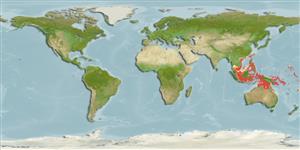>
Gobiiformes (Gobies) >
Gobiidae (Gobies) > Gobiinae
Etymology: Trimma: Greek, trimma, -atos = something crushed (Ref. 45335); hollemani: Named for Wouter Holleman, a world expert on the systematics of tripterygiid and clinid fishes..
Environment: milieu / climate zone / depth range / distribution range
ນິເວດວິທະຍາ
ສັດທະເລ; ລະດັບຄວາມເລິກ 8 - 70 m (Ref. 109919). Tropical
Western Pacific: the Philippines, Malaysia, Indonesia, Australia and Papua New Guinea.
ຂະໜາດ / ນ້ຳໜັກ / Age
Maturity: Lm ? range ? - ? cm
Max length : 2.8 cm SL ຕົວຜູ້/ບໍ່ມີເພດ; (Ref. 109919)
Short description
ຕົວທີ່ໃຊ້ໃນການຈຳແນກຊະນິດ | ສະລີລະວິທະຍາ | ການວັດແທກຮູບຮ່າງລັກສະນະພາຍນອກຂອງດິນ,ສັດ,ປາ…
ຄີ (ໜາມ)ແຂງຢູ່ຫຼັງປາ (ທັງໝົດ) : 7; ຄີຫຼັງຂອງປາ (ຄີອ່ອນ) (ທັງໝົດ) : 7 - 8; ຄີ(ໜາມ) ແຂງຢູ່ຄີກົ້ນປາ
ກຸ່ມປາກະດູກແຂງ
ຄວາມຖີ່ຂອງກຸ່ມຖ່າຍທອດພັນ
ປາທີ່ມີການເຄື່ອນຍ້າຍຈາກທະເລໄປຫານ້ຳຈືດ ແລະນ້ຳຈືດຫາທະເລ
ປາທີ່ມີການເຄື່ອນຍ້າຍຈາກທະເລແລະໄປໄຂ່ຢູ່ນ້ຳຈືດ
ຄີກົ້ນຂອງປາ
ສັດທີ່ມີກະດູກສັນຫັຼງ
ການຖ່າຍທອດທາງກຳມະພັນຈາກພໍ່ແມ່ຫາລູກ: 1; ຄີກົ້ນຂອງປາ: 7 - 8. This species is distinguished by the following characters: a bony interorbital 82-100% pupil diameter; usually 11 ctenoid scales in predorsal midline; second dorsal spine may reach to the base of the third dorsal fin ray (in mature males) or anterior to this point; usually five free neuromasts (sensory papillae) in row r on the top of the snout, pectoral-fin rays usually 14-15 with 1-4 branched rays in about half the individuals; an unbranched fifth pelvic-fin ray that is 47-64% the length of the fourth ray. Colour of freshly collected specimens: a red to yellow background colour, a light stripe along the mid-lateral body that continues forward over the top of the pupil ending posteriorly at a pale bar across the peduncle in front of the dark caudal blotch; a light stripe below the eye bordered dorsally by a narrow red stripe (both light stripes blue in life). In preserved specimens, the central dark stripe on the snout (blue in life) is usually made up of amorphous brown chromatophores, often with a few scattered rounded very dark chromatophores, a dark blotch made up of rounded brown chromatophores on chin just behind the symphysis, and at least some dark chromatophores on the lower lip (Ref. 109919).
Found in caves of reef slopes also with overhangs and crevices; in areas with sand, some rubble and gorgonians, small, hard and soft corals, Tubastrea, sea whips, some black coral, sea fans, tunicates, sponges, some hydroids (Ref. 109919).
Life cycle and mating behavior
Maturities | ການສືບພັນ | Spawnings | Egg(s) | Fecundities | ຕົວອ່ອນ
Winterbottom, R., 2016. Trimma tevegae and T. caudomaculatum revisited and redescribed (Acanthopterygii, Gobiidae), with descriptions of three new similar species from the western Pacific. Zootaxa 4144(1):001-053. (Ref. 109919)
IUCN Red List Status (Ref. 130435)
Threat to humans
Harmless
Human uses
ເຄື່ອງມື
Special reports
Download XML
ແຫຼ່ງອີນເຕີເນັດ
Estimates based on models
Phylogenetic diversity index (Ref.
82804): PD
50 = 0.5000 [Uniqueness, from 0.5 = low to 2.0 = high].
Bayesian length-weight: a=0.00708 (0.00333 - 0.01504), b=3.09 (2.92 - 3.26), in cm total length, based on LWR estimates for this (Sub)family-body shape (Ref.
93245).
ຄວາມຢືດຢຸ່ນ (Ref.
120179): ສູງ, ປະຊາກອນຕຳ່ສຸດທີ່ໃຊ້ເວລາສອງໜ້ອຍກວ່າ 15 ເດືອນ (Preliminary K or Fecundity.).
Fishing Vulnerability (Ref.
59153): Low vulnerability (10 of 100).
